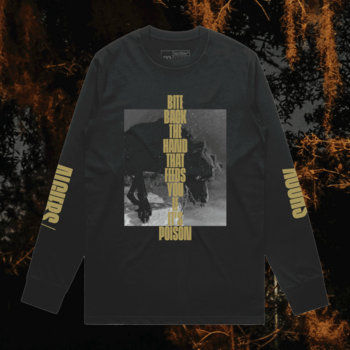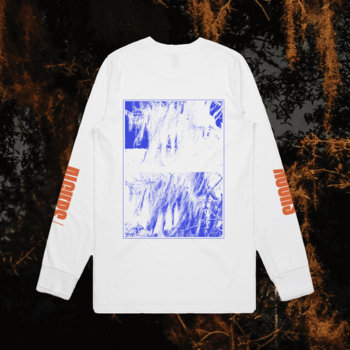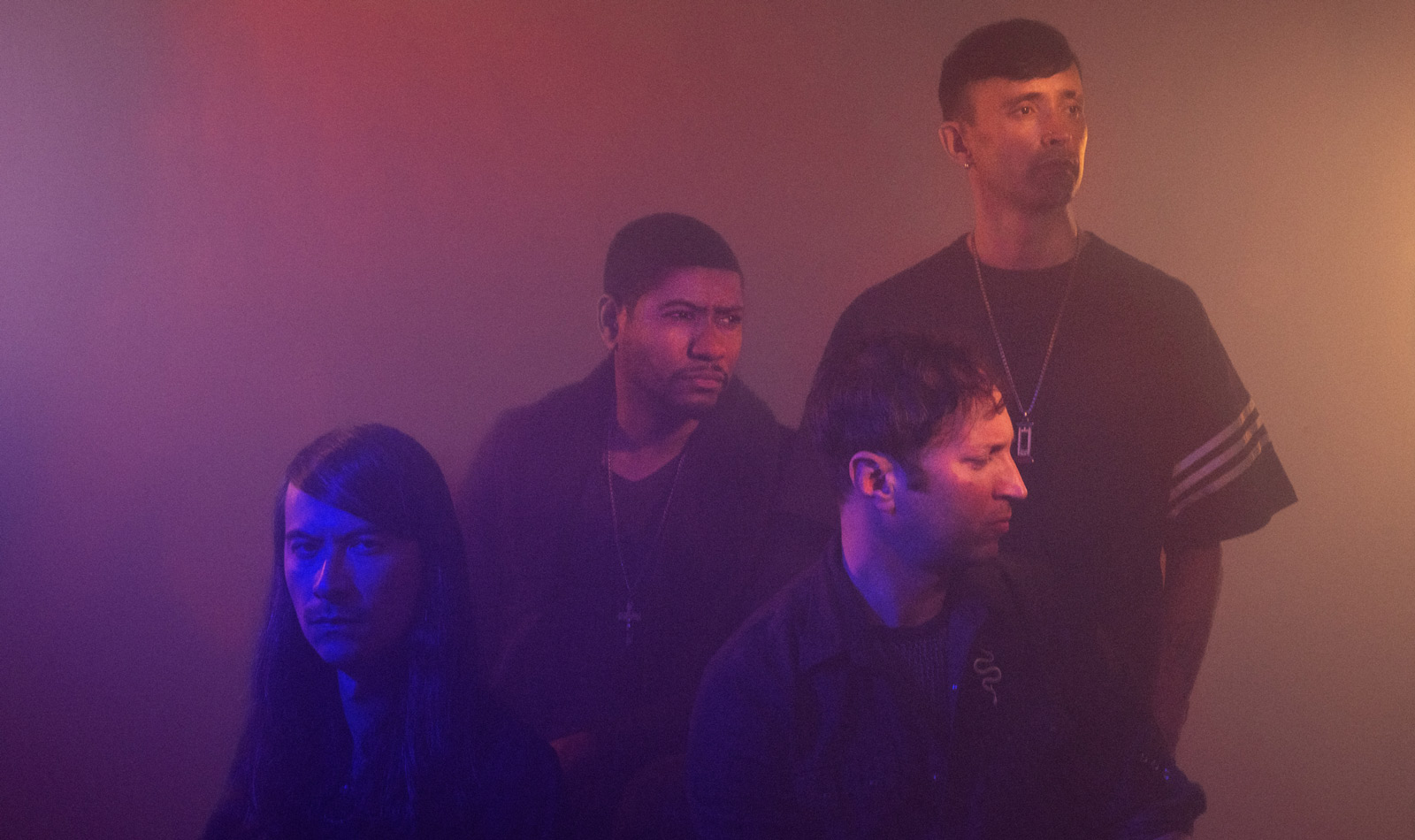 Photo by Ebru Yildiz
Photo by Ebru Yildiz
Shook, Algiers’s fourth album, captures the Atlanta art rock quartet in a moment of metamorphosis. The shadowy sonic atmospheres and revolutionary essence that brought them international renown remains intact, but the band no longer carries the weight of the struggle alone. Instead, they enlist an army of collaborators to expand the borders of their post-apocalyptic rage. Shook pans rapidly between festival stage heavyweights (Rage Against the Machine’s Zack de la Rocha), beloved voices delivering underground wisdom (Dungeon Family’s Big Rube), acclaimed hip-hop experimentalists (rapper-producers Backxwash and billy woods), and rising jazz improvisers (saxophonist Patrick Shiroishi), depicting the brightly-burning embers of a dying world from a dizzying array of viewpoints. It’s a meticulously crafted headstone above the concept of genre—a monument to Algiers’s renewed dedication to resisting capitalism’s spirit-crushing atomization, but delivered with a hopeful certainty that, beneath the grim wreckage of capitalism, life itself soldiers on.
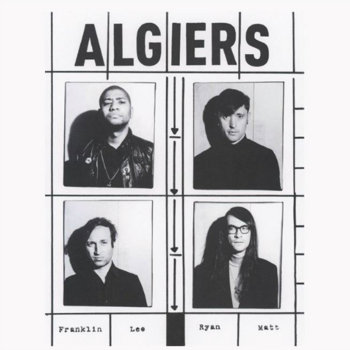

2 x Vinyl LP, Compact Disc (CD), T-Shirt/Shirt, Other Apparel, Hat, Cassette

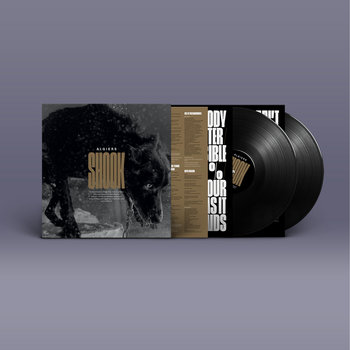
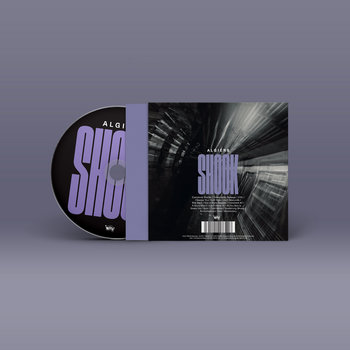
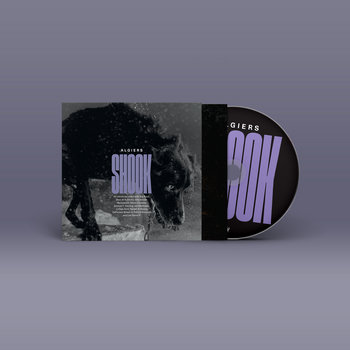
This past December, Brooklyn venue National Sawdust became the proving ground for the band’s bracing transformation—a preview screening for the next chapter of the end times. To drive home their break with the past, Algiers eschewed the traditional opener-headliner format, working instead with infinitely hyphenated, longtime New York City renegade KING VISION ULTRA to assemble a daring soundclash, bookending their stage time with two daring performances by KVU’s “Shook World Soundsystem.”
Despite the illusion of pure improvisation, as local stars ranging from noise mastermind Dreamcrusher to rappers maassai, amani, and ELUCID hopped on and off stage, KVU’s two cypher-like “sets” drew mostly on material from his companion album Shook World. Created in part from Shook’s audio stems, which the group gave him after a spontaneous dinner conversation last November, on Shook World, the galaxy-spanning vision of Shook narrows, zooming in on the battleground of New York City. Shook World, released a full month before Shook with Algiers’s blessing, is a murky, mystifying, multi-generational subway ride, where poetry from stylistic chameleon DJ Haram seeps up alongside samples of Jean Grae and DJ Kid Capri, where Company Flow’s Bigg Jus’s stately, laidback flow lurks around the block from Dreamcrusher’s unearthly howls. On stage, presented as one collective outburst against categorization, the two albums blended into a dazzling experimental flurry, each voice delivering a detailed lesson on the power of community to cut through the bullshit.
We asked Algiers, who were phoning in from their European tour, and KVU, who was calling from his Queens apartment, to break down the process of creating their respective albums and the ways the two operate as works in conversation with one another.





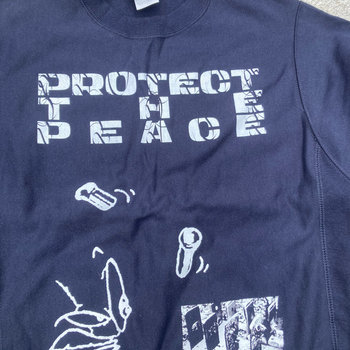
Cassette, Sweater/Hoodie, T-Shirt/Shirt




What was the first meeting between y’all like?
KING VISION ULTRA: I met [Algiers bassist] Ryan [Mahan] first, via our homie, Nicky [aka Hiro Kone]. We met at a venue after a King Vision Ultra show situation, and shortly after Lee slid into my DMs and we just started building basically from there. They sent me the album, and then I didn’t get to meet [guitarist] Lee [Tesche] nor [vocalist] Frankie [Fisher] until we all had dinner in, what was it, November? We had some good Tibetan food and talked about Fat Joe’s Yeezy boots. Important things.
Ryan Mahan: We hadn’t really fully formulated the idea of doing this. We knew that we wanted to drop something that was even more embedded in hip-hop, but other than that, we didn’t really know. And I know Lee wanted to do something that took our Atlanta sounds and had their own interpretation from another place. New York seemed to be the spot that made the most sense [to create this] because that’s where Frankie lives, and it is also a formative place for us. So that’s part of it.
Lee Tesche: My entry point to KVU’s work was through some of the mixes that he had done in the past and through his work with sampling. [To KVU:] I mean, I listened to a lot of interviews you did too before we even met. It just seemed like you were coming from the same place that we were in the way that we work with sounds and samples and just the recontextualization of things in your work. So I think as we were talking, just that idea really started to take shape. KVU and I had been texting and stuff a lot. But we just had the full faith and confidence to say, ‘Make your art, do your thing.’ We had ideas of maybe how we thought it would play out, but it was mostly just giving him free rein to do whatever. There wasn’t really any grand plan.
2 x Vinyl LP, Compact Disc (CD), T-Shirt/Shirt, Other Apparel, Hat, Cassette




With your own record, how did the collaborative focus come about?
Frankie Fisher: I think the collaboration idea was an outgrowth of what we wanted to do with our previous record, which was to have a multiplicity of voices. For one, I got tired of hearing 800 versions of myself copied and pasted and singing back at me on every fucking record. But also, Algiers’s ethos, philosophy, and politics are about inclusivity and people generally on the margins, so that was our comfort zone anyway. It was like, ‘Well, let’s get our people together and see if they want to do something.’ The vast majority of the vocals and background vocals on our records have been me. And it’s just like, ‘We can go beyond this, make it more interesting, bring in other people, and that not only makes it more aesthetically rich and complex, but politically and socially as well.’
When I started writing a lot of the songs that became a lot of the demos for this record, my emphasis was looking back at the DNA of what inspired our band and what’s happening in this collaboration, which was looking at New York back in the day, or looking at the spirit of what was happening before there were names for things like hip-hop or for punk rock. It’s only because of capitalism and the sort of retroactive and anachronistic placing of genre and categorization that people think that these things are divergent or so mutually exclusive. They never are.
Mahan: There’s this interstitial element, too, that calls back to The Last Poets or cats just who would use the voice as something that’s not only social but familial. One of the ideas I got was [from] hearing Master P on Solange’s record just on the phone. I was like, ‘Oh, shit. That would be so dope if we put Rube on the phone.’






Cassette, Sweater/Hoodie, T-Shirt/Shirt




What surprised you most about the finished product? Were you at all in touch while KVU was working on Shook World?
Mahan: We didn’t hear anything until it was absolutely finished. Absolutely done and dusted. We got the sequence one day, and we were like, ‘Oh.’ You knew that it was going to be deep. It blew my mind, because you can pick out so many of the [original] tracks in the samples, but in a way that none of us would’ve ever envisioned. It is just a whole new world. And then, on top of that, you have just all of these people with all these beautiful words—like Desde, like Nakama., like maassai, like amani. The list goes on and on and on. I was like, ‘Wow, this is a really complete work.’ And I thought it was amazing to have something like that come out before our shit, because it can live in a completely different space, both before and after.
Tesche: A lot of Shook was us reconnecting with where we’re from and the city where we met and found ourselves back in at the beginning of the pandemic. There are elements of our record that are a love letter to Atlanta. It exceeded expectations when I heard Shook World because it’s this really incredible love letter to New York.
KVU: What’s ill about this shit, and I think what’s been throwing some people—the traditional so-called journalist or whatever—off too, is that they see the word collaboration they think we’re in the studio together, looking over each other’s shoulders, doing handstands on each other. But there’s potential for collaboration within conversation and Shook is collaboration overhaul. I spent months not really being able to start ’cause I had other things going on. So I was just like, ‘All right, well I’m just going to listen to the hell out of Shook.’ So I’m spending time with the work and being like, ‘Okay, I see this happening here. I see, oh, okay.’
When I get something and I’m told, ‘Here’s some things. Here’s some tools,’ I want to learn them and learn how to use them so that I can almost bend them—you know what I’m saying? I want to be able to almost break them and put them back together again. I’m not going to take the main guitar riff necessarily, or use it the same way. Why would you want to hear that? Why would Algiers want to hear me do the same thing that they did with that sound? I want to hack that shit. I’m trying to hack it all, flip it on its head type shit.
The train thing was the easy backbone—I got these recordings from the train passing overhead, and then the voice messages that I wanted to use, all of which had the train in the background. I didn’t plan that. That shit was crazy to me. So I was just like, “What do you get when you go on the train in New York City?” You get this melding of worlds, ’cause everyone from Wall Street people to people who don’t have a home are on the train at the same time at any given time of day.
Mahan: The found sound shit really jumps out at me in terms of our experience with Atlanta. We left Atlanta, so a lot of that is a sense memory rather than an actual experience. We’re dealing with this elusive world that we came from, but that we might not be in all the time and that we revisit. And I feel like I got that same experience [from Shook World], but in a totally different way. I don’t know how to explain it other than you mirrored that, with the chatter from gentrifiers and the overall metallic sounds.
KVU: Hopefully people see that. Hopefully when people listen to Shook and Shook World not only are they hearing certain sounds pop back up, but they’re also getting that these two albums are holding hands under the table.
How do you keep the facts straight with a work like this, celebrating a time and a place, without getting too nostalgic or overly mythologizing the past?
KVU: I mean first and foremost, I’m going to create presently. I’m not trying to take y’all back in the day. I’m not trying to teach you how to do a head spin or something and call it a day—roll out the linoleum or some shit. This isn’t 1980. This isn’t Style Wars, or whatever. It’s steeped in that tradition; that’s how I grew up. That’s in the DNA. But that’s not something I got to flex. That’s the point of having those 16 voices, or collaborators—people of various eras and people who have been outside longer than others. So you have folks like LaTasha Diggs and Matana Roberts and Bigg Jus who have all been outside a little bit longer than I have. They’re almost like my elders basically, but they’re also my friends. And then you have folks who you could mistakenly say that I mentor—which I don’t. There’s an even exchange. amani, maassai, Nakama, Desde, Kayso—so-called ‘current New York.’ But it’s different wavelengths working concurrently. So it’s more concurrent New York, you know what I’m saying? And that whole ‘Please Leave’ joint, that’s a little statement. That’s just one part of it. We’re not just about ‘Fuck the Gentrifiers.’ But it does need to be stated. You need to flip off a tour bus here and there.

